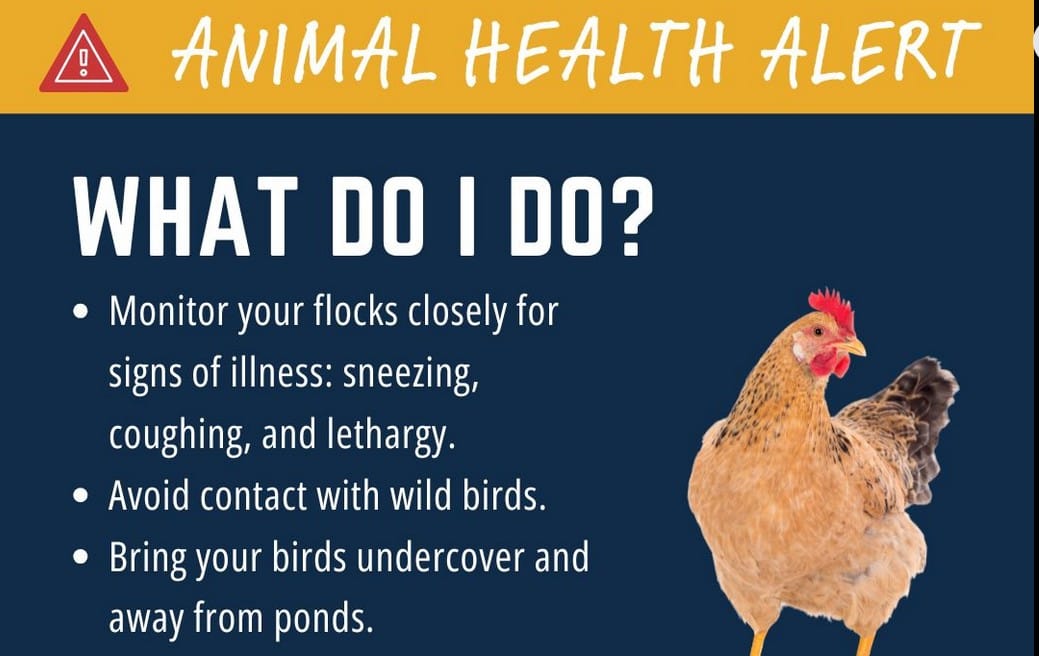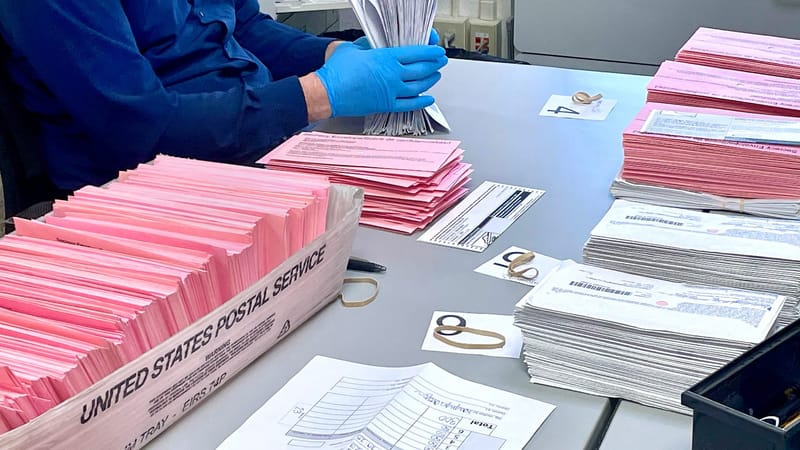WSDA finds bird flu near Moses Lake, health advisory issued

OLYMPIA – The Washington Department of Agriculture on Friday confirmed Grant County’s first case of avian influenza among sick birds in a large commercial poultry facility near Moses Lake.
The initial report of sick birds came in to state veterinarians on Oct. 7 and test results showed cases of highly pathogenic avian influenza (HPAI or H5N1), commonly known as bird flu, the WSDA announced.
The department did not specify the number of birds involved or respond to an email seeking additional information Monday afternoon.
While the detection involved a large commercial poultry facility, the agency said in a press statement Friday that the majority of past detections have been in backyard flocks. Veterinarians note the biggest risk continues to be contact with wild waterfowl or shared environments and WSDA urges all poultry owners to practice strong biosecurity measures.
“This first detection of the season is a sobering reminder that highly pathogenic avian influenza remains a threat to all domestic poultry — large or small — statewide,” said Dr. Amber Itle, Washington State Veterinarian. "Keeping birds away from wild waterfowl, limiting access to your flock, and keeping species separate are some of the best ways to reduce the risk of this devastating disease.”
Flock owners within 6 miles (10 kilometers) of a detection are in a surveillance zone and are encouraged to self-report the health of their flock. WSDA recommends using the online surveillance self-reporting tool and interactive map to determine surveillance zones.
“Self-reporting allows WSDA veterinarians to quickly reach out to stakeholders, share critical biosecurity tips and help protect more poultry owners statewide with accurate information,” the department stated.
The Grant County Health District and state Department of Health are monitoring for illness among workers with exposure to infected birds as a precautionary measure.
No human cases or person-to-person spread of bird flu have been identified, locally or nationwide, at this time, the health district stated in a press release Friday.
“While the risk to humans is low, there are steps you can take to keep you and your family safe,” health officials said. “People who have job-related or recreational exposure to infected birds or other animals are at higher risk and should take precautions.”
Bird flu is a disease caused by influenza viruses that naturally occur among wild aquatic birds. Other birds and animal species may also get infected, and in rare cases can make people sick.
While this is the first domestic bird outbreak in Grant County, over 100 wild birds have tested positive for bird flu in the county since January 2022, the health district said.
Nationwide, the large-scale outbreak which began that year has resulted in the deaths of over 170 million birds across all 50 U.S. states and Puerto Rico, according to federal authorities. It has significantly affected the commercial poultry industry, especially laying hens. Since 2024, there have been 70 confirmed human cases of bird flu in the United States and one confirmed death.
Persons at higher risk of exposure include poultry and dairy workers, home poultry owners, veterinary personnel, and hunters. Locally, anyone with increased exposure risks to H5 bird flu can request personal protective equipment by calling the Grant County Health District at 509-770-7960.
Symptoms of bird flu are similar to other influenza symptoms: fever, muscle aches, cough, sore throat, abdominal pain, vomiting, diarrhea, eye infection, and respiratory ailments including difficulty breathing and pneumonia.
Persons experiencing such symptoms after potential exposure should contact their doctor.
Avian influenza is spread by infected animals through their saliva, mucus, and feces. It is also found in the raw milk of infected dairy cattle.
People should not handle sick or dead birds or livestock. Sick or dead domestic animals can be reported to the state Department of Agriculture at 1-800-606-3056. Sick or dead wild birds or animals can be reported to the Washington Department of Fish and Wildife through an online form.
Health officials urge people to practice good hygiene, washing hands frequently and having dedicated clothing which remains outside the home after handling or being around birds and livestock. Pets should be protected, limiting their unsupervised time outdoors and monitoring hunting dogs used to retrieve wild game. Cats are especially vulnerable to bird flu.




